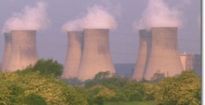WH Asks for Nuke Safety Review
The Nuclear Regulatory Commission will conduct a “comprehensive review” of the safety of all U.S. nuclear plants following what U.S. officials are calling the dangerous and complicated situation at Japan’s damaged Fukushima Dai-ichi reactors.
President Barack Obama took the rare step and called upon the independent commission to conduct the review.
“When we see a crisis like the one in Japan, we have a responsibility to learn from this event and to draw from those lessons to ensure the safety and security of our people,” Obama said Thursday.
Obama’s statement came as he tried to reassure a worried nation that “harmful levels” of radiation from the Japanese nuclear disaster are not expected to reach the U.S., even as other officials conceded it could take weeks to bring the crippled nuclear complex under control.
Meanwhile, the first evacuation flight of U.S. citizens left Japan, the State Department said.
“We’ve seen an earthquake and tsunami render an unimaginable toll of death and destruction on one of our closest friends and allies in the world,” Obama said in brief remarks at the White House after a visit to the Japanese Embassy to offer his condolences.
There are 104 nuclear reactors in the United States, providing roughly 20 percent of the nation’s electricity. “Nuclear energy is an important part of our own energy future,” Obama said.
A leading industry group agreed with the review.
“A review of our nuclear plants is an appropriate step after an event of this scale, and we expect that the Nuclear Regulatory Commission will conduct its own assessment,” said Marvin Fertel, president of the Nuclear Energy Institute. “The industry’s highest priority is the safe operation of 104 reactors in 31 states and we will incorporate lessons learned from this accident...”
In the U.S., Customs and Border Protection said there had been reports of radiation being detected from some cargo arriving from Japan at several airports, including ones in Chicago, Dallas and Seattle.
Radiation had not been detected in passengers or luggage. And none of the reported incidents involved harmful amounts.
Homeland Security Secretary Janet Napolitano said the agency was screening passengers and cargo for “even a blip of radiation.”
Obama said he knows that Americans are worried about potential risks from airborne radiation that could drift across the Pacific. “So I want to be very clear,” he said. “We do not expect harmful levels of radiation to reach the United States, whether it’s the West Coast, Hawaii, Alaska or U.S. territories.”
Gregory Jaczko, chairman of the Nuclear Regulatory Commission, told reporters at a White House briefing it could be some time before the crisis is brought under control as crews work to cool spent-fuel rods and get the damaged Japanese reactors under control. The activity could continue for days and “possibly weeks,” Jaczko said.
He said the U.S. recommendation that American troops and citizens stay 50 miles away from the nuclear complex was “a prudent and precautionary measure to take.” But he also said “basic physics” suggested there was little risk to anyone in the United States or its Pacific territories.
Daniel B. Poneman, deputy secretary of energy, told the briefing that a “very dangerous situation” remains in Japan. Information at the nuclear plant is “genuinely complex and genuinely confusing,” he said.
Click here to read more.


